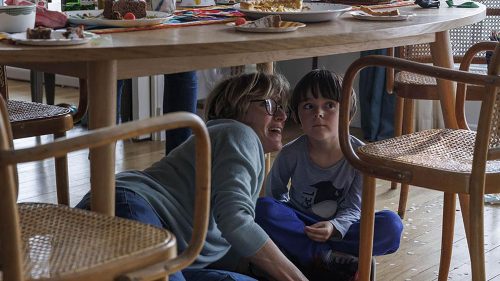
In her fifth feature film, French-Belgian director and writer Carine Tardieu is in competition in Orizzonti with L’Attachement, a film about emotional bonds and their evolution starring Valeria Bruni Tedeschi.
What were the main sources of inspiration for the screenplay of L’attachement, and how did they influence your approach to the mise-en-scène?The film is based on a novel, and one line deeply resonated with me: when young Elliott learns of his mother’s death, he comments, “Already?”. This unique relationship with time, as experienced through the eyes of children, greatly influenced the staging. From the writing phase, we chose to develop the film over a period of two years, the time needed for mourning and attachment, using the younger sister’s age as a marker throughout.
I was very impressed by the effective use of ellipses in Almodóvar’s Parallel Mothers and Richard Linklater’s Boyhood, both of which explore family bonds. The work of Noah Baumbach and Claude Sautet, who excel in portraying complex emotions with apparent simplicity, also inspired me greatly.
Additionally, the presence of children on set naturally brought a certain lightness to the atmosphere, requiring a mobile camera to capture the unexpected moments as they unfolded.

Based on the novel L’intimité by Alice Ferney, adapted by the director along with Agnès Feuvre (winner of the 2022 César for Best Original Screenplay with The Divide) and long-time collaborator and author Raphaële Moussafir, the film centers around ...
The theme of the emotional bond is central to the film. How did you approach this topic in the narrative, and what do you hope the audience will take away from it?
While writing, I was influenced by John Bowlby’s theory, which suggests that a child forms attachments primarily with those who care for them, driven by a survival instinct rather than affection. Elliott and Alex bond with their neighbour, not because of who she is, but simply because ‘she’s there.’ Their love grows from this initial attachment. Sandra, on the other hand, discovers how challenging it is to resist these bonds once they are formed. Despite this, I wanted to maintain a certain independence in her character, allowing her to stay ‘free’ until the end, so that her attachment to this family wouldn’t be seen as a sacrifice. I hope the audience reflects on how emotional bonds form and evolve, and on the complex, sometimes inevitable, impact they have on our lives.

A film that delves into the emotional dynamics between the characters. How did you work with Valeria Bruni Tedeschi to capture this intensity and vulnerability?
The character of Sandra is almost against Valeria’s nature. We crafted a new silhouette for her, with a bag, glasses, and a short haircut, which she quickly embraced. Valeria, who is naturally warm and expressive, is often cast in more extroverted roles, while Sandra was written as a reserved, even distant woman who carefully weighs her words. On set, I had to constantly temper Valeria’s natural character to maintain the character’s tone. This internal struggle may have contributed to the vulnerability that comes through in her performance. Her acting, so organic, far exceeded my expectations.
How does L’attachement fit into the evolution of your filmography?
I was intrigued by the idea of portraying a modern woman who defies patriarchal norms, asserting her independence and embracing celibacy without feeling the need to justify it. However, when she is unexpectedly moved by the affection of a child and her grieving father, her foundations begin to crumble. L’attachement is my first film deeply infused with my own experience of motherhood, and in this way, my perspective as a director has profoundly changed.